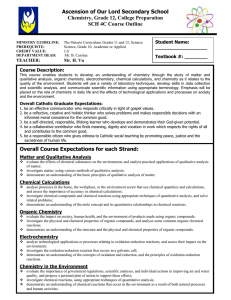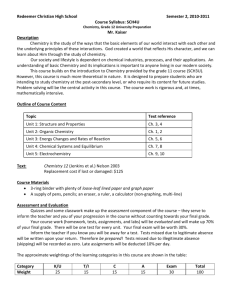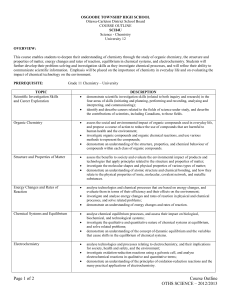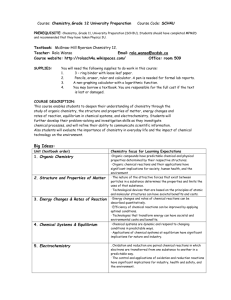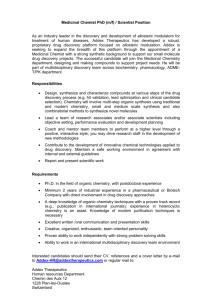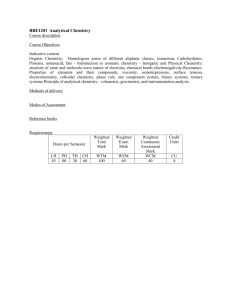SCH 4C1 - Holy Cross Catholic Academy
advertisement
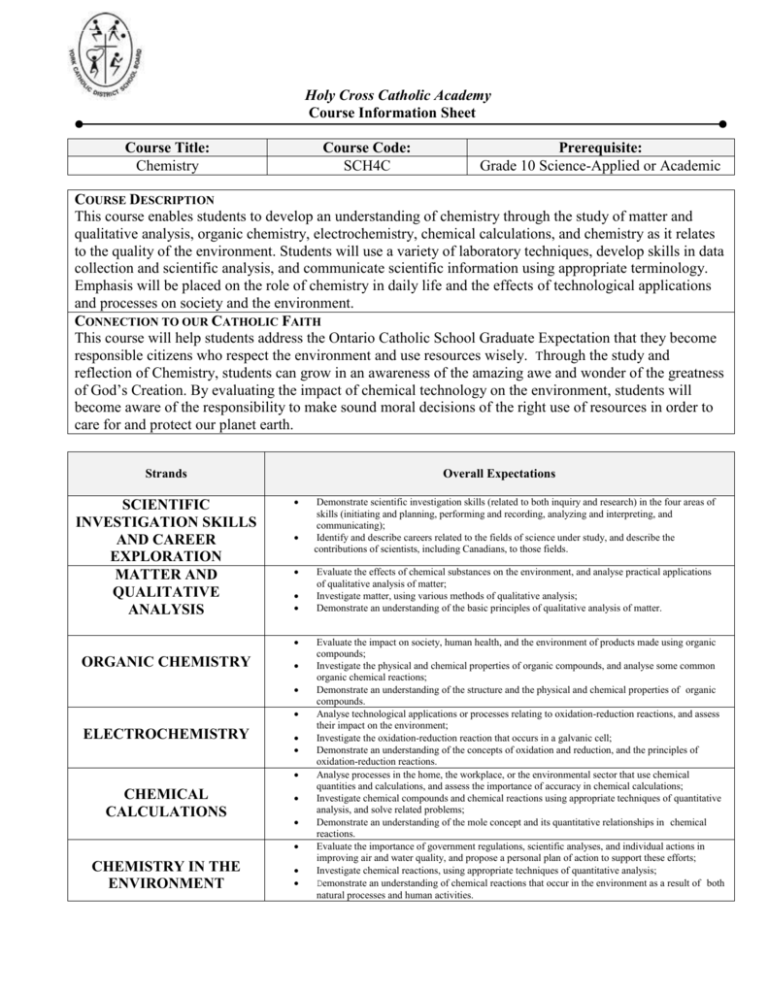
Holy Cross Catholic Academy Course Information Sheet Course Title: Chemistry Course Code: SCH4C Prerequisite: Grade 10 Science-Applied or Academic COURSE DESCRIPTION This course enables students to develop an understanding of chemistry through the study of matter and qualitative analysis, organic chemistry, electrochemistry, chemical calculations, and chemistry as it relates to the quality of the environment. Students will use a variety of laboratory techniques, develop skills in data collection and scientific analysis, and communicate scientific information using appropriate terminology. Emphasis will be placed on the role of chemistry in daily life and the effects of technological applications and processes on society and the environment. CONNECTION TO OUR CATHOLIC FAITH This course will help students address the Ontario Catholic School Graduate Expectation that they become responsible citizens who respect the environment and use resources wisely. Through the study and reflection of Chemistry, students can grow in an awareness of the amazing awe and wonder of the greatness of God’s Creation. By evaluating the impact of chemical technology on the environment, students will become aware of the responsibility to make sound moral decisions of the right use of resources in order to care for and protect our planet earth. Strands SCIENTIFIC INVESTIGATION SKILLS AND CAREER EXPLORATION MATTER AND QUALITATIVE ANALYSIS Overall Expectations ORGANIC CHEMISTRY ELECTROCHEMISTRY CHEMICAL CALCULATIONS CHEMISTRY IN THE ENVIRONMENT Demonstrate scientific investigation skills (related to both inquiry and research) in the four areas of skills (initiating and planning, performing and recording, analyzing and interpreting, and communicating); Identify and describe careers related to the fields of science under study, and describe the contributions of scientists, including Canadians, to those fields. Evaluate the effects of chemical substances on the environment, and analyse practical applications of qualitative analysis of matter; Investigate matter, using various methods of qualitative analysis; Demonstrate an understanding of the basic principles of qualitative analysis of matter. Evaluate the impact on society, human health, and the environment of products made using organic compounds; Investigate the physical and chemical properties of organic compounds, and analyse some common organic chemical reactions; Demonstrate an understanding of the structure and the physical and chemical properties of organic compounds. Analyse technological applications or processes relating to oxidation-reduction reactions, and assess their impact on the environment; Investigate the oxidation-reduction reaction that occurs in a galvanic cell; Demonstrate an understanding of the concepts of oxidation and reduction, and the principles of oxidation-reduction reactions. Analyse processes in the home, the workplace, or the environmental sector that use chemical quantities and calculations, and assess the importance of accuracy in chemical calculations; Investigate chemical compounds and chemical reactions using appropriate techniques of quantitative analysis, and solve related problems; Demonstrate an understanding of the mole concept and its quantitative relationships in chemical reactions. Evaluate the importance of government regulations, scientific analyses, and individual actions in improving air and water quality, and propose a personal plan of action to support these efforts; Investigate chemical reactions, using appropriate techniques of quantitative analysis; Demonstrate an understanding of chemical reactions that occur in the environment as a result of both natural processes and human activities. Units and Timelines Unit Title Approximate Time Matter and Qualitative Analysis 18 lessons Quantities in Chemistry 20 lessons Organic Chemistry 20 lessons Chemistry in the Environment 14 lessons Electrochemistry 12 lessons Instructional strategies: modeled, shared and guided instruction, cooperative group learning, accountable talk, independent application and consolidation, experiential learning, inquiry-based learning, robust thinking (critical analysis and reflection). Assessment and Evaluation Breakdown CATEGORIES 100% Knowledge/Understanding 25% TERM 70% FINAL 30% Thinking 25 % CPT EXAM Communication 10 % 5% 25% Application 10 % Assessment and Evaluation Strategies: classroom presentations, conferences, essays, response journals, demonstrations, interviews, learning logs, quizzes, tests, and exams, observations, performance tasks, portfolios, question and answers, self-assessment. Assessment and Evaluation Tools: Checklists, exemplars, rating scales, rubrics, metacognition, self and peer assessment, anecdotal notes. Focus on Learning Skills Responsibility Organization Fulfils responsibilities and commitments within the learning environment. Completes and submits class work, homework, and assignments according to agreed-upon timelines. Takes responsibility for and manages own behaviour. Devises and follows a plan and process for completing work and tasks. Establishes priorities and manages time to complete tasks and achieve goals. Identifies, gathers, evaluates, and uses information, technology, and resources to complete tasks. Independent Work Independently monitors, assesses, and revises plans to complete tasks and meet goals. Uses class time appropriately to complete tasks. Follows instructions with minimal supervision. Collaboration Initiative Accepts various roles Looks for and and an equitable share of acts on new ideas work in a group and opportunities Responds positively to for learning. the ideas, opinions, Demonstrates values, and traditions of the capacity for others. innovation and a Builds healthy peerwillingness to to-peer relationships take risks. through personal and Demonstrates media-assisted curiosity and interactions. interest in Works with others to learning. resolve conflicts and Approaches build consensus to new tasks with a achieve group goals. positive attitude. Shares information, Recognizes resources, and expertise, and advocates and promotes critical appropriately for thinking to solve problems andthe make rights of self decisions. and others Self-Regulation Sets own individual goals and monitors progress towards achieving them. Seeks clarification or assistance when needed. Assesses and reflects critically on own strengths, needs, and interests. Identifies learning opportunities, choices, and strategies to meet personal needs and achieve goals. Perseveres and makes an effort when responding to challenges. N.B. Additional Information Found in Student’s School Agenda/Board Policy: Lates, Absences and Missed Assignments follow the YCDSB Assessment & Evaluation Guidelines, in compliance with the Ministry of Education Policy on Assessment, Evaluation and Reporting. Student Fees: In accordance with Board Policy 601, there are no course fees for basic course materials (e.g. textbooks, workbooks, handouts). Some courses may offer enhancements (e.g. field trips, musical instruments, activities) for which there maybe a fee. Board Policy 601 is available on the board website at www.ycdsb.ca. Title of Textbook: Nelson Chemistry 12: College Prep Name of Teacher: ________________________________________ Student Signature Replacement Cost: $100 _______________________________________ Parent/Guardian Signature
